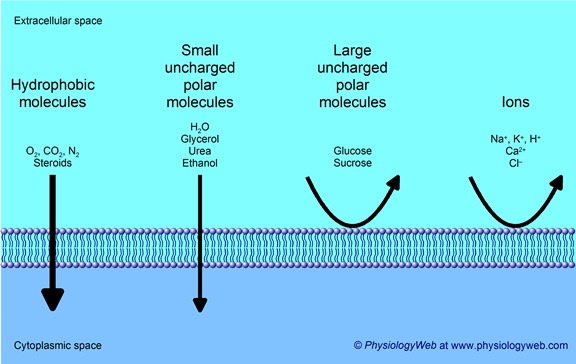This note introduces the importance of cell membranes in the process of diffusion and osmosis and how cell membranes prevent certain molecules crossing into the cytoplasm of the cell. This would appeal to anyone studying intermediate level biology.
Pinned to
421
5
0
No tags specified
|
|
Created by jill.examtime
over 11 years ago
|
|
|
|
Copied by daniel.praecox
over 11 years ago
|
|
Rate this resource by clicking on the stars below:




 (1)
(1)
Ratings (1)
| 0 | ||
| 0 | ||
| 0 | ||
| 0 | ||
| 1 |
0 comments
There are no comments, be the first and leave one below:
Close
430785
note
2016-12-12T00:31:19Z
1/1
Cellular Membranes
All the membranes in a cell, biological membranes, are similar in structure and in the way they operatie. This means that the cell or plasma membrane is the same as the membrane around the organelles such as the mitochondria and chloroplasts. A membrane is said to be permeable to a substance if the substance can pass through it and impermeable if it cannot pass through.
All the membranes in a cell, biological membranes, are similar in structure and in the way they operatie. This means that the cell or plasma membrane is the same as the membrane around the organelles such as the mitochondria and chloroplasts. A membrane is said to be permeable to a substance if the substance can pass through it and impermeable if it cannot pass through.
Selectively Permeable Cell Membranes
A selectively permeable membrane allows some but not all substances to pass through. Biological membranes are said to be selectively permeable, as at materials such as cellophane, visking tubing and dialysis tubing. These membranes allow molecules such as water, oxygen and carbon dioxide to pass through freely. They do not however, allow sugars, proteins and salts to pass through easily. Although membranes are relatively impermeable to some substance, cells have specialised mechanisms in their membranes to allow these substance to pass through when necessary. For example, Glucose has to pass in through the plasma or cell membrane to allow for respiration.
A selectively permeable membrane allows some but not all substances to pass through. Biological membranes are said to be selectively permeable, as at materials such as cellophane, visking tubing and dialysis tubing. These membranes allow molecules such as water, oxygen and carbon dioxide to pass through freely. They do not however, allow sugars, proteins and salts to pass through easily. Although membranes are relatively impermeable to some substance, cells have specialised mechanisms in their membranes to allow these substance to pass through when necessary. For example, Glucose has to pass in through the plasma or cell membrane to allow for respiration.
Example of Selectively Permeable Cell Membrane
An example of a semi-permeable membrane is the Lipid Bilayer. The plasma membrane that surrounds all cells is based on this. A group of Phospholipids (consisting of a phosphate head and two Fatty Acid tails) arranged into a double-layer, the phospholipid bilayer is a semipermeable membrane that is very specific in its permeability. The hydrophilic phosphate heads are in the outside layer and exposed to the water content outside and within the cell. The hydrophobic tails are the layer hidden in the inside of the membrane. The phospholipid bilayer is the most permeable to small, uncharged solutes. Protein channels float through the phospholipids, and, collectively, this model is known as the fluid mosaic model.
An example of a semi-permeable membrane is the Lipid Bilayer. The plasma membrane that surrounds all cells is based on this. A group of Phospholipids (consisting of a phosphate head and two Fatty Acid tails) arranged into a double-layer, the phospholipid bilayer is a semipermeable membrane that is very specific in its permeability. The hydrophilic phosphate heads are in the outside layer and exposed to the water content outside and within the cell. The hydrophobic tails are the layer hidden in the inside of the membrane. The phospholipid bilayer is the most permeable to small, uncharged solutes. Protein channels float through the phospholipids, and, collectively, this model is known as the fluid mosaic model.

Selectivity of Cell Membranes
